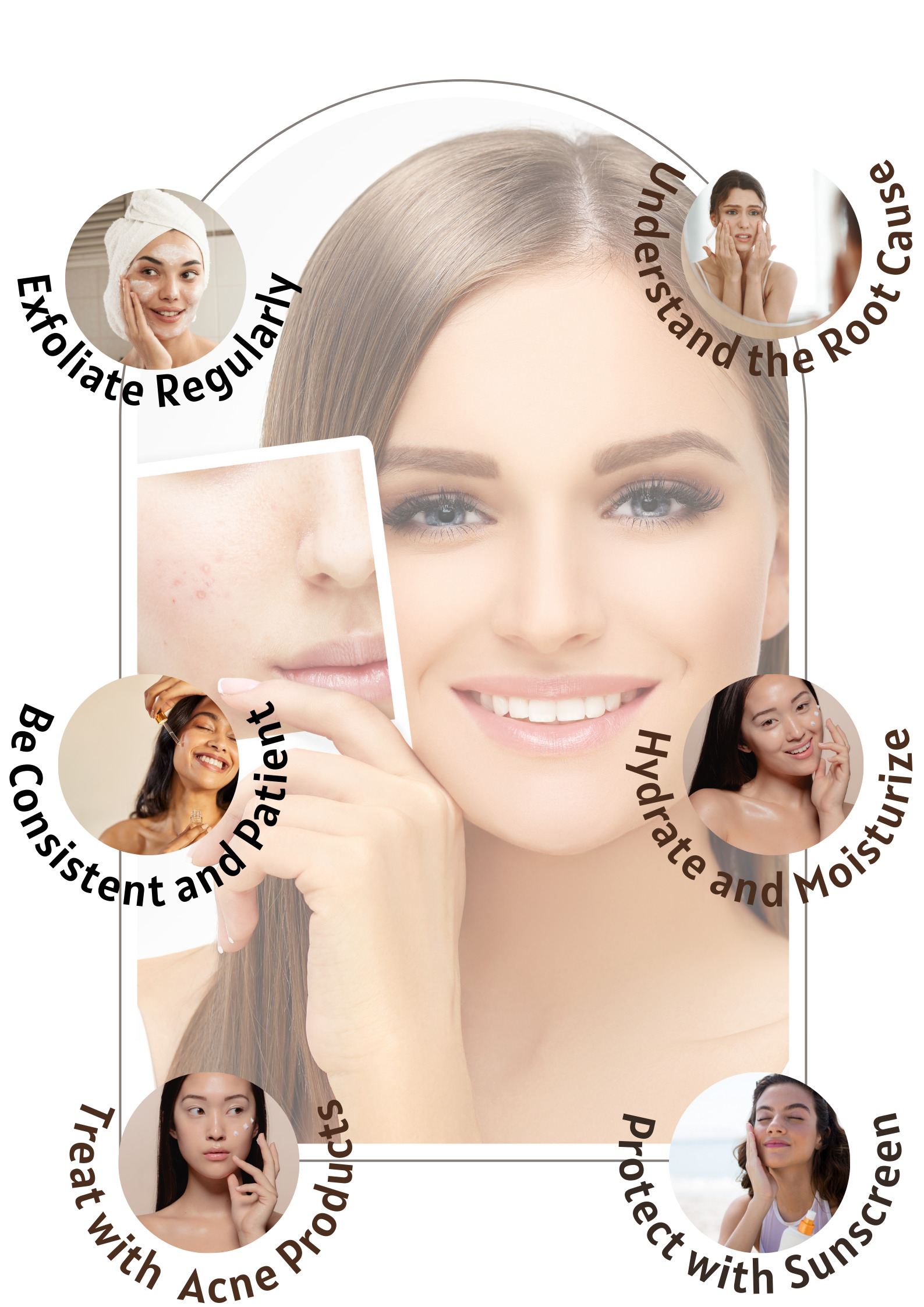Dr Ankita S
MBBS, MS, DNB OBGY
Dealing with acne can be frustrating. Hormonal acne affects both men and women, often appearing as deep, painful pimples that emerge around the jawline, chin, and occasionally on the cheeks and forehead. While hormones play a significant role in triggering these breakouts, a consistent and tailored skincare routine can help manage and minimise their impact. In this blog, we’ll explore an effective skincare routine specifically designed to combat hormonal acne, leaving you with clearer, healthier skin.
What is Hormonal Acne and what causes it?
Hormonal acne is caused by hormone levels fluctuation. The high levels of androgens act on the sebaceous glands to produce excess oily sebum. Hence, given an oily skin. Acne comes from the interlinkage between the skin oils,bacteria and dead skin cells.
Hormonal acne resembles usual acne, but with deeper pores and painful cysts. The breakouts occur on the unusual spots of the face, like on the chin, around the mouth and upper neck that last for longer periods.
How to prevent Hormonal acne?
There is no cure for hormonal acne,as it involves fluctuations in your hormonal levels in the body. Knowing the root cause and controlling hormone levels will help you treat and prevent it. In the following we shall explore some of the skincare tips to prepare your skin to protect from acne.
Most dermatological experts suggest a stepwise approach to female adult acne treatment that utilises different drugs depending on the severity and the type of the individual’s acne lesions
1. Understand the Root Cause:
Hormonal acne is a result of fluctuating hormone levels which stimulate excess sebum production, leading to clogged pores and breakouts. Understanding this underlying cause is crucial for designing an effective skincare routine to manage hormonal acne.
2. Cleanse Gently, But Thoroughly:
Start your routine with a gentle cleanser to remove dirt and excess oils that doesn’t strip your skin of its natural oils.
3.Exfoliate Regularly:
Exfoliation plays a vital role in managing hormonal acne. By removing dead skin cells, you prevent them from accumulating and clogging your pores. However, be cautious not to over-exfoliate, as it can irritate your skin and exacerbate the problem.
4. Treat with Targeted Acne Products:
Incorporate acne treatments specifically designed to target hormonal acne into your skincare routine. Look for products containing ingredients like retinoids or tea tree oil, which help regulate sebum production and reduce inflammation. These treatments can be used as spot treatments on active breakouts or applied all over the affected areas.
5. Hydrate and Moisturize:
Contrary to popular belief, moisturising is crucial even for acne-prone skin. Hydration helps maintain the skin’s moisture balance, preventing it from producing excess oil to compensate for dryness. Choose oil-free, non-comedogenic moisturisers to avoid clogging your pores. Look for ingredients like hyaluronic acid to keep your skin hydrated and plump.
6.Protect with Sunscreen:
Sunscreen is a non-negotiable step in any skincare routine, especially for acne-prone skin. UV rays can trigger inflammation and post-inflammatory hyperpigmentation, making acne scars more prominent. Opt for a broad-spectrum sunscreen with an SPF of 30 or higher and apply it generously, even on cloudy days.
7. Nourish from Within:
While external skincare is essential, don’t forget the impact of nutrition on your skin. A balanced diet rich in fruits, vegetables, whole grains, and lean proteins can help regulate hormone levels and promote healthy skin. Stay hydrated by drinking plenty of water and consider incorporating supplements like omega-3 fatty acids and zinc, known for their anti-inflammatory properties.
8. Be Consistent and Patient:
Managing hormonal acne requires patience and consistency. Results may not be immediate,
and breakouts might still occur occasionally. However, with a dedicated skincare routine, you can minimise their severity and frequency over time. Stick to your routine diligently and give it at least 4-6 weeks before expecting significant improvements.

Conclusion
References
1.Burger, H. G. (2002). Androgen production in women. Fertility and sterility, 77, 3-5.
2.Carmina, E., Dreno, B., Lucky, W. A., Agak, W. G., Dokras, A., Kim, J. J., … & Dumesic, D. (2022). Female adult acne and androgen excess: A report from the multidisciplinary Androgen Excess and PCOS committee. Journal of the Endocrine Society, 6(3), bvac003.
3.Leung, A. K., Barankin, B., Lam, J. M., Leong, K. F., & Hon, K. L. (2021). Dermatology: how to manage acne vulgaris. Drugs in context, 10.
4.Romitti, M., Fabris, V. C., Ziegelmann, P. K., Maia, A. L., & Spritzer, P. M. (2018). Association between PCOS and autoimmune thyroid disease: a systematic review and meta-analysis. Endocrine Connections, 7(11), 1158.
5.Kowalczyk, K., Franik, G., Kowalczyk, D., Pluta, D., Blukacz, Ł., & Madej, P. (2017). Thyroid disorders in polycystic ovary syndrome. European Review for Medical and Pharmacological Sciences, 21(346-360).
6. Calvar, C. E., Bengolea, S. V., Deutsch, S. I., Hermes, R., Ramos, G., & Loyato, M. (2015). High frequency of thyroid abnormalities in polycystic ovary syndrome. Medicina, 75(4), 213-217.
Frequently Asked Questions
An effective skincare routine for hormonal acne typically includes:
A anti-acne or an over the counter salicylic acid based face wash to wash your face twice daily.
An oil-free, non-comedogenic moisturiser to keep the skin hydrated without clogging pores.
An oil-free sunscreen to protect your skin from UV damage.
Yes, certain lifestyle changes can be beneficial in managing hormonal acne. These may include:
Maintaining a balanced diet rich in fruits, vegetables, and whole grains while limiting sugary and high-glycemic foods.
Regular exercise, which can help regulate hormones and improve overall health.
Managing stress through relaxation techniques, meditation, or hobbies.
Dr Ankita S
MBBS, MS, DNB OBGY
Varshini
M.Tech Food Biotechnologist
Varshini
M.Tech Food Biotechnologist
Related Blogs
- How to prevent Prediabetes from Turning into DiabetesSeptember 19, 2023
- Unravelling the connection: insulin Resistance and PCOSSeptember 8, 2023






